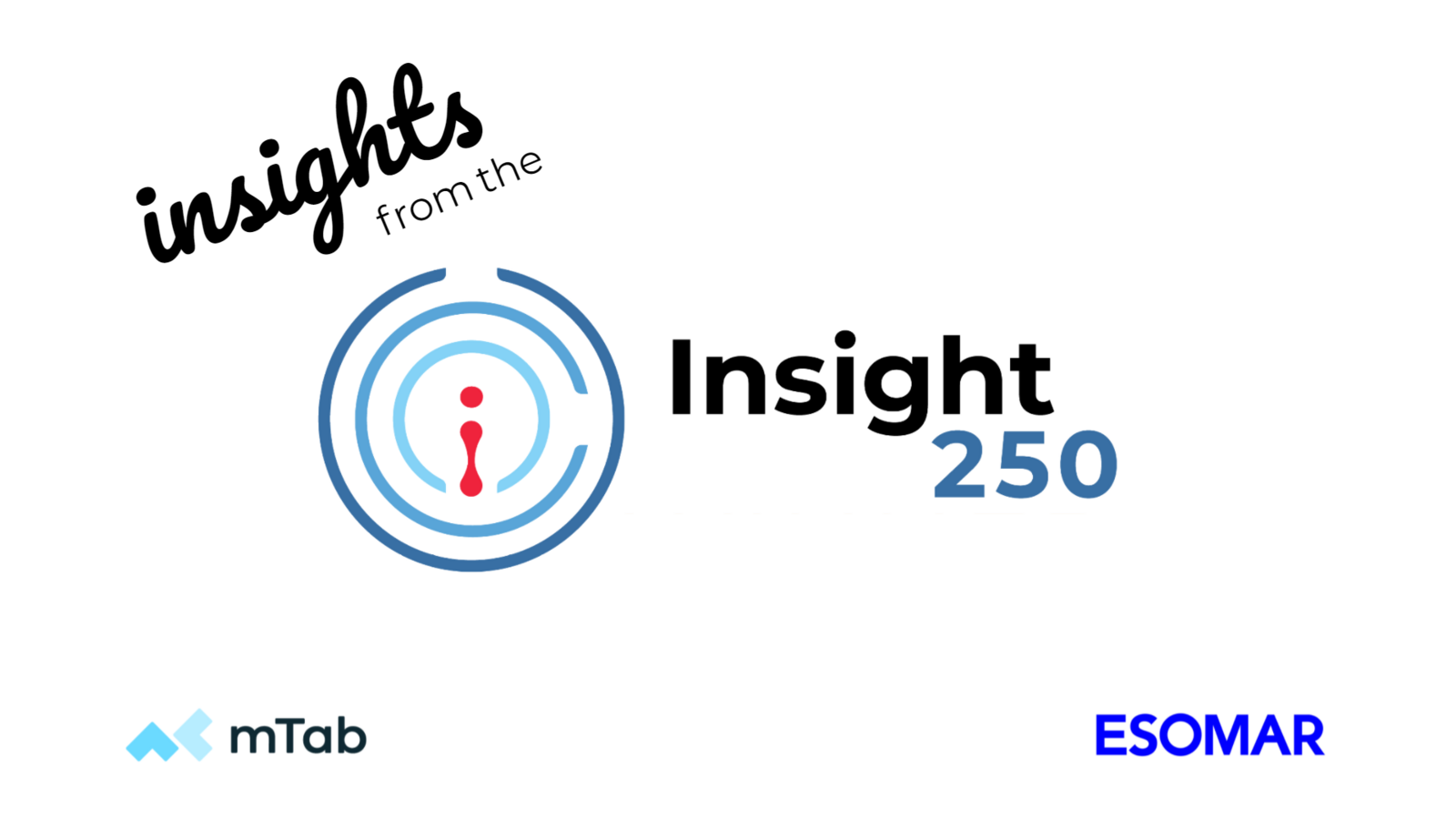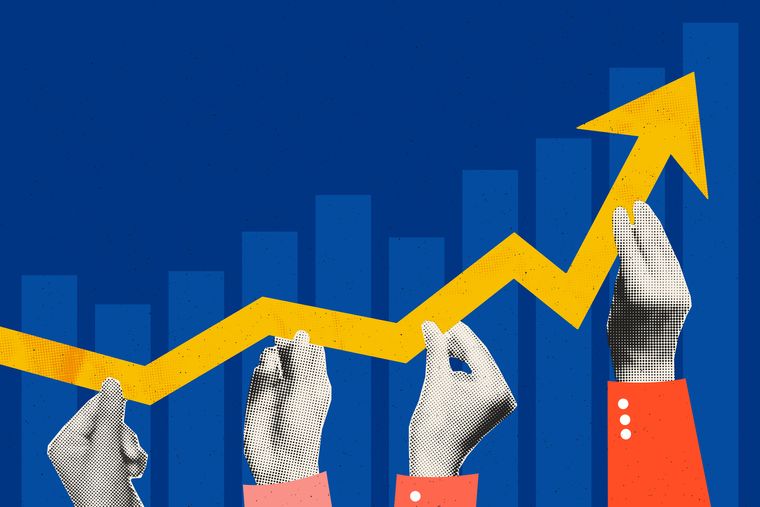The importance of business sense in research
Part of the Insight from the Insight250 series. Kristin Luck, ESOMAR President is interviewed by Crispin Beale.

Article series
Insight250
- The importance of business sense in research
- The role of humour in effective leadership
- The importance of ethics
- The importance of disruption in innovation and leadership
- The importance of Disruption in Innovation and Leadership Part 2
- The importance of Diversity & Inclusion
- The impact of colour
- Communicating insight with impact
- Insights on leadership, culture and polling
- The evolution of electric vehicles
- 2022 Top tips (part 1)
- 2022 Top tips (part 2)
- Maximising the potential of data
- The importance of flexible working
- Winners
- The importance of advanced analytics
- Judges for the 2022 Insight250 Awards announced
- The evolution from social listening to digital intelligence
- The Judges' Perspective
- The judge's perspective - part 2
- Insight Climate Collective
- Insights technology
- Understanding employee ownership
- Global insight perspectives
- Top Tips from our Leaders and Innovators
- The Evolution of Insights in the Food & Beverage Market
- The Evolution of Insights in CPG
- Neural Mechanisms Behind Consumer Decision-Making
- Celebrating and Elevating the Insights Industry
- The State of the Insights Industry
- Opportunities, challenges and threats that AI presents
- 2024 Insight250 Winners Announcement
- Connecting Brands and Consumers Through Insights
- The Importance of Human Insight and Attention
- The Elevating Role of Insights with Technology Innovation
- Haleon’s Insight Expert on Consumer Healthcare
- Insight from the Insight250: How AI is Impacting Qualitative Research
- How AI Tech is Doing the ‘Heavy Lifting’ for Insights
- Reviewing the top tips for 2025
- Google's Sarah Ashley on AI and revolutionising insights - Insights from the Insight250
- Beyond BI: The Future of Decision Intelligence for Insight Professionals
- The Advancement & Impact of Insights - An Insight250 Winners Series perspective with David Smith
- International Jury for the 2025 Insight250 Awards Announced
- Newly elected President, Anne-Sophie, on Revolutionizing the Impact of Insights
- Haleon's Litthya Baez on Enhancing Healthcare with Insights - Insight250 Winners Series
- Understanding the Insights of Consumer Decisions
- Moving Beyond Dashboards to Deliver Decisions with AI
- How AI is Transforming Insights
- How AI is Transforming Insights
- Five Years of Insight250: Elevating the Insight Industry
The Insight250 spotlights and celebrates 250 of the world’s premier leaders and innovators in market research, consumer insights and data-driven marketing. The inaugural list was revealed this April and created renewed excitement across the industry whilst strengthening the connectivity of the market research community.
With so many exceptional professionals named to the Insight250 it seems fitting to tap into their expertise and unique perspectives across an array of topics. This weekly series does just that; inquiring about the expert perspectives of many of these individuals in a series of short topical features.
This edition features Kristin Luck, a powerhouse who knows all sides of market research, having held global leadership positions within corporates and ESOMAR, as well as founding WIRe and her own consultancy ScaleHouse. I spoke to Kristin to discuss the growing importance of developing a strong business sense and commercial acumen in today’s industry and the competitive edge it provides.
What do you mean when you talk about commercial acumen and business sense, or nous, being so important?
Excellent research skills simply aren’t enough to truly excel in this industry and deliver actionable recommendations to clients. Like many in this industry, I didn’t go to business school and so when I started my own company, the sudden need to understand everything from business finance to strategy was a rude awakening. As an industry we do a great job of training and mentoring employees in research methods, less so in what it takes to run a business which is paramount to understanding and being able to solve clients' real needs.
Kristin Luck
Why do you think so many in our industry fail to use a commercial lens when presenting research findings?
I think much of our failure to look through a commercial lens is simply a result of genuine naivete about business strategy and what data is truly important to the C-suite. Chris Burggraeve gave a great talk at ESOMAR Congress two years ago where he mentioned the importance of thinking “like a CFO” and presenting “like a CMO”. As researchers we tend to get caught up in the minutia of project-to-project thinking rather than looking holistically at the bigger picture of what’s going on with a company or a brand.
Kristin Luck
You sit on a multitude of boards - what differences do you see when management consultants present rather than researchers and what can we learn from this?
‘Big Consulting’ focuses on five key factors that researchers often don’t; 1) Storytelling (although with all the storytelling training going on in this industry, we should be experts by now!), 2) Being hypothesis driven, 3) Owning the analysis, 4) Focusing on the “so what” and 5) Breaking down silos. Too often researchers try to boil the ocean rather than focusing on the real business problem, which Big Consulting is adept at getting to more quickly and efficiently than traditional research firms.
Kristin Luck
Sir Martin Sorrell is shaking things up with S4Capital - why do you think this has been so successful?
I think there’s a misnomer that to grow, and grow quickly, you need to be all things to all people, when the inverse is true. S4 is solely focused on digital and what they refer to as “the holy trinity” – combining first party data with digital content data and digital media. They also don’t shy away from conversion (whereas their competitors are focusing largely on measurement) which is a real differentiator.
Kristin Luck
Author's note: I’ve just interviewed Sir Martin Sorrell so watch this space for his views on disruption and much more.
Can we apply any of those lessons at ESOMAR where you have recently been elected President?
Absolutely. Our Council objectives are solely focused on growth (new members) and access & engagement (existing members) – we’re not trying to boil the ocean.
In terms of growth, we are taking a more data driven approach to running ESOMAR which means we’ve migrated from Netsuite to Salesforce and Salesforce Marketing Cloud so we can accurately map a proper marketing to sales funnel and understand what the drivers are behind membership. We’re also focused on bringing in UX researchers, data scientists and DaaS providers so that our member base better represents our evolving industry. Lastly, our investment portfolio (which is significant) has been in a highly conservative/defensive position for over 10 years which means we’ve missed out on some significant market returns. Alain Mizrahi, Council Treasurer, along with the ESOMAR finance team, has repositioned the portfolio into a more moderate offensive position to take better advantage of market opportunities and decrease our cash position (which was costing us money).
Looking at access & engagement, we’re updating our website from a custom build to a standard WordPress CMS to make access to ESOMAR content and our directory easier, particularly on mobile devices. Council also passed our dynamic pricing initiative in July to ensure that, as of October 1, membership is equitable regardless of where you live in the world.
And that’s just in the first six months of this Council’s term. Stay tuned - much more is in the works!
Kristin Luck
In a recent podcast, Stan at Unilever suggested clients can now have their research “better, faster & cheaper” - do you agree? Are there compromises?
When I started out in online research (1998!), the saying was “better, faster & cheaper” but pick two because you can’t have all three. I still believe that’s the case if you’re just utilising primary research data but when you start throwing behavioral or other passively collected data sources into the mix it changes the conversation entirely. My concern with saying “better, faster & cheaper” but relying only on primary research data is that we have pushed sample pricing (and thus data quality) as low as it can feasibly go – we are on a race to the bottom that I fear will have a profound long-term impact on respondent trust and, thus, data accuracy.”
Kristin Luck
Where do you see the biggest opportunities for innovation and leadership within our space? In your experience, which companies and geographies are moving fastest?
I tend to follow the money when I look at growth opportunities. If you look at 2020 (as odd a year as it was), although some $600 million was invested in market research related enterprises, the driver behind last year’s investment boom was analytics, specifically customer analytics. The need for companies to understand, analyse and act on changes in consumer behaviors is clearly highly valued.
“When we look strictly at market research, investment rests almost entirely in data collection platforms – unsurprising due to the recent success of Qualtrics and SurveyMonkey. Platforms (both MR and analytics) accounted for 20% of all investment in 2020, demonstrating that investors have faith in the future of self-service research. Whether this will also create more opportunity for full service, more consultative firms, remains to be seen.
Kristin Luck
What role do you see associations like ESOMAR playing in driving innovation and leading our profession?
Given our global membership base ESOMAR has unparalleled access to best-in-class field tested methods in every research market around the world. Some of the most innovative research methods I’ve seen are coming out of conflict markets like South Sudan and Afghanistan or geographies where there is significant political unrest, like LATAM, following a heavy election year throughout the region. ESOMAR is truly the glue that connects researchers, regardless of where they are in the world. This type of knowledge sharing beyond borders is what has been proven, time and time again, to drive innovation.
HOT TOPIC: Kristin, you have been on the Board of Trustees for The Nature Conservancy for several years, why is sustainability important and what more should our profession be doing to champion this agenda?
Our industry is not immune to the impact of issues like climate change, forced migration (due to several forces at play including religious conflict and reduced access to natural resources), persecution based on sexual preference, the battle for women’s reproductive rights, income inequality, access to healthcare, the rise of nationalism, racism and a myriad of other societal challenges. Being cognisant of these multi-layered and complex issues and how they impact the ways in which people live, consume, and relate to their environment, which is under increasing stress, is paramount to understanding the human condition- and that’s really our role as researchers; to analyse and drive change utilising data as our foundation.”
Kristin Luck
These are such important topics and I couldn’t agree more. Just a reminder for everyone that later this month there’s an online conference, that I know you have championed Kristin, on Sustainability, #WeBetterBehave2021 (sign-up free via https://webetterbehave.live/ ). This event has keynotes from previous Insight250 interviewees including Pepsi’s Stephan Gans and Boot’s Pete Markey. Coming up on 11th November there is also the MRS Sustainability Summit.
Crispin Beale
Two great events that in my opinion it is well worth signing up for
.. So, finally Kristin, I always ask for a top tip - what’s yours?
Never stop learning.
Kristin Luck
Thanks Kristin - a great tip and indeed a fascinating interview which lots for us all to reflect upon. Thank you.
Crispin Beale
Chairman at QuMind, CEO at Insight250, Senior Strategic Advisor at mTab, CEO at IDXCrispin Beale is a marketing, data and customer experience expert. Crispin spent over a decade on the Executive Management Board of Chime Communications as Group CEO of leading brands such as Opinion Leader, Brand Democracy, Facts International and Watermelon. Prior to this Crispin held senior marketing and insight roles at BT, Royal Mail Group and Dixons. Crispin originally qualified as a chartered accountant and moved into management consultancy with Coopers & Lybrand (PwC). Crispin has been a Board Director (and Chairman) of the MRS for nearly 20 years and UK ESOMAR Representative for c15 years. As well as being CEO of Insight250, Crispin is currently Worldwide CEO of Digital Communications Solution Agency, IDX. Crispin is also the Senior Strategic Advisor at mTab and the Chairman of QuMind and spent 4 years as Group President of Behaviorally where he was responsibile for the client & commercial teams globally. Crispin is a passionate advocate for blending human intelligence and technology to deliver innovation and leadership across organisations.
Article series
Insight250
- The importance of business sense in research
- The role of humour in effective leadership
- The importance of ethics
- The importance of disruption in innovation and leadership
- The importance of Disruption in Innovation and Leadership Part 2
- The importance of Diversity & Inclusion
- The impact of colour
- Communicating insight with impact
- Insights on leadership, culture and polling
- The evolution of electric vehicles
- 2022 Top tips (part 1)
- 2022 Top tips (part 2)
- Maximising the potential of data
- The importance of flexible working
- Winners
- The importance of advanced analytics
- Judges for the 2022 Insight250 Awards announced
- The evolution from social listening to digital intelligence
- The Judges' Perspective
- The judge's perspective - part 2
- Insight Climate Collective
- Insights technology
- Understanding employee ownership
- Global insight perspectives
- Top Tips from our Leaders and Innovators
- The Evolution of Insights in the Food & Beverage Market
- The Evolution of Insights in CPG
- Neural Mechanisms Behind Consumer Decision-Making
- Celebrating and Elevating the Insights Industry
- The State of the Insights Industry
- Opportunities, challenges and threats that AI presents
- 2024 Insight250 Winners Announcement
- Connecting Brands and Consumers Through Insights
- The Importance of Human Insight and Attention
- The Elevating Role of Insights with Technology Innovation
- Haleon’s Insight Expert on Consumer Healthcare
- Insight from the Insight250: How AI is Impacting Qualitative Research
- How AI Tech is Doing the ‘Heavy Lifting’ for Insights
- Reviewing the top tips for 2025
- Google's Sarah Ashley on AI and revolutionising insights - Insights from the Insight250
- Beyond BI: The Future of Decision Intelligence for Insight Professionals
- The Advancement & Impact of Insights - An Insight250 Winners Series perspective with David Smith
- International Jury for the 2025 Insight250 Awards Announced
- Newly elected President, Anne-Sophie, on Revolutionizing the Impact of Insights
- Haleon's Litthya Baez on Enhancing Healthcare with Insights - Insight250 Winners Series
- Understanding the Insights of Consumer Decisions
- Moving Beyond Dashboards to Deliver Decisions with AI
- How AI is Transforming Insights
- How AI is Transforming Insights
- Five Years of Insight250: Elevating the Insight Industry


